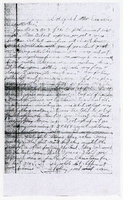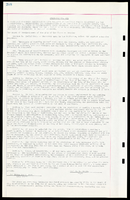Search the Special Collections and Archives Portal
Search Results

Transcript of interview with Michael DeJong by David G. Schwartz, July 6, 2016
Date
Archival Collection
Description
Text
Robert F. Knapp oral history interview
Identifier
Abstract
Oral history interview with Robert Knapp conducted by Dianna Lucero on March 10, 1981 for the Ralph Roske Oral History Project on Early Las Vegas. Knapp discusses his personal and occupational history in Las Vegas, Nevada. He also talks about the major hotels, politics, gambling, and road recreations.
Archival Collection

Letter from C. A. Earle Rinker to his mother, December 24, 1907
Date
Archival Collection
Description
Text
Jeju Hyatt Regency Casino Records
Identifier
Abstract
The Jeju Hyatt Regency Casino Records date to 1985 and contain information about the Korean casino and its operation guidelines for various games, the conduct of their employees, and business reports for the casino. This information is provided in both English and Korean.
Archival Collection
Harold Stocker oral history interview
Identifier
Abstract
Oral history interview with Harold Stocker conducted by Ralph Roske and Elizabeth Warren on November 30, 1971 for the Ralph Roske Oral History Project on Early Las Vegas. In this interview, Stocker discusses his upbringing, family life, and his experiences working the Northern Club owned by his mother, Mayme Stocker. Lastly, Stocker talks about the history of gambling and prohibition.
Archival Collection
Desert Inn "Black Book" Photograph Collection
Identifier
Abstract
The Desert Inn "Black Book" Photograph Collection (1955-1969) consists of 36 black-and-white photographs of individuals arrestest for gambling-related crimes in Reno, Sparks, and Las Vegas, Nevada and Oakland, California. The photographs contain information on the verso with name, date of birth, crime(s) committeed, and known aliases and associates and where gathered by Desert Inn security. These types of photographs were widely circulated amongst casinos, particularly after the formation of the Gaming Control Board in 1955 and the Gaming Control Act in 1959. Crimes listed include slot spooner, slot slugger, dice switcher, and hand mucker.
Archival Collection
Brian Block oral history interview
Identifier
Abstract
Oral history interview with Brian Block conducted by Diane Spero on February 27, 1979 for the Ralph Roske Oral History Project on Early Las Vegas. Block discusses the construction business, community planning, architectural design, and his personal feelings in regard to the development of the Las Vegas, Nevada area. Block also discusses legalized gambling, politics, mass transit problems, and other social and environmental changes in Nevada.
Archival Collection

Transcript of interview with Brian Block by Diane Spero, February 27, 1979
Date
Archival Collection
Description
Text


